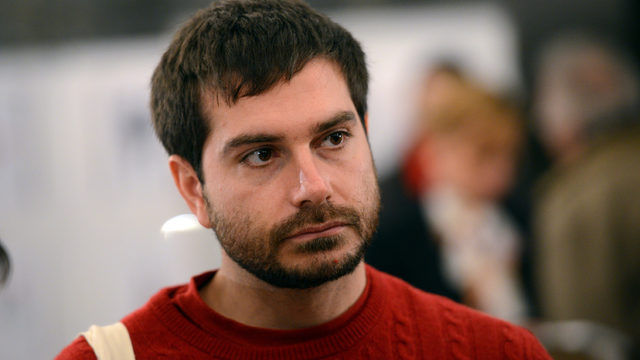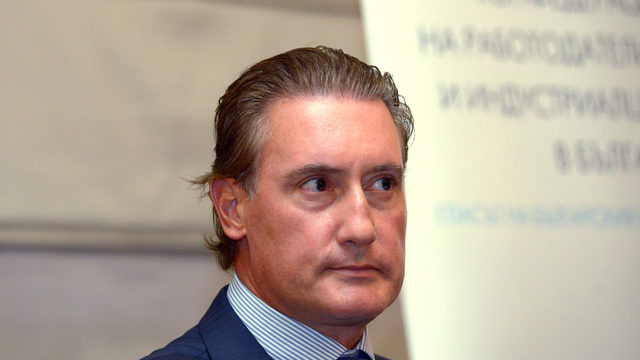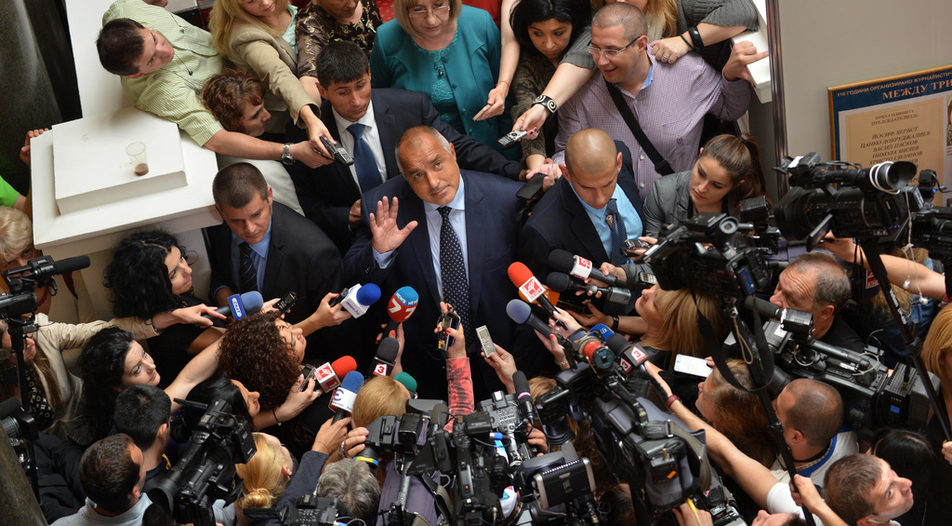The Bulgarian media ecosystem has a notoriously bad reputation both inside and outside the country. Nearly every report by an NGO, media freedom watchdog, or EU institution that deals with fundamental freedoms or an article about Bulgaria mentions this.
In October last year, Reporters Without Borders (RSF) placed Bulgaria in - infamous - 111th spot in media freedom in the world, far below any other European state, and in the illustrious company of Kuwait and Bolivia.
In its 2020 Freedom in the world report, Freedom House, which has generally been more favorable than RSF, downgraded Bulgaria's score from 3 out of 4 points to 2, citing "sustained pressure by the government and pro-government investors on independent media".
Bulgaria's reputation is now so low that even amidst a pandemic, when the Prime Minister travels to Austria to join a "pressure group" calling for EU-wide redistribution of vaccines, foreign journalists quiz him about press freedom. "In Bulgaria, freedom of expression is so free, that it is hard to compare to other countries," Mr Borissov responded (literal translation). He then pressed his point: "Your question about the freedom of media is incorrect! Why? The largest media in Bulgaria are held by large foreign companies. The largest TV channel, bTV, is held by Czech citizen Mr Kellner, who also bought a mobile operator. The other big TV, "Nova TV," was bought by one of the biggest [corporate] groups, United. All are 100 percent owned by them. They are not connected to us in any way," he said.
Superficially, that's true. Looking at Bulgaria's scores in international rankings, it is hard to say that its media environment is as bad as that of autocratic Kuwait. Neither are journalists treated as they are in Nigeria, where mass roundups of critical reporters are commonplace. TV shows welcome politicians from various parties, online investigative sites such as Bivol publish corruption investigations, newspapers issue highly critical comments on government actions
So what then, spurred Christophe Deloire, secretary general of RSF, to describe the media situation as "worse than ever" in October 2020, when he said that Bulgaria was "embroiled in an extremely serious media civil war," and expressed concern about harassment of journalists, political manipulation of media, and a collapse of professional ethics in the media?
If you are critical, expect harassment
Before we evaluate systemic problems, let's look at the treatment sometimes meted out to journalists and publishers who criticize the government or some minor or major businessperson linked to it.
One possibility is that their cases get ignored, like that of reporter Dimiter Kenarov. He was beaten and arrested by the authorities during last summer's protests. Despite clear evidence of police abuse, he is still waiting for his case to reach court almost seven months later.

Or the story of Slavi Angelov, one of the longest serving criminal journalists, who got beaten to a pulp in front of his home in 2020, but is still waiting for the police to discover who ordered it - despite the physical assailants having been arrested some time ago.
Sometimes journalists get death threats that are never properly investigated, like in the case of Nickolay Staykov from the Anti-corruption Fund. Staykov and his family received the threats just days prior to the release of his "Eight dwarfs" investigation into how the prosecution service is acting as a personal punishment squad for hostile business takeovers.
There are even cases when a journalist was sued for libel and has his case assigned to a judge he criticized in the past - as in the case of Capital Weekly's Rossen Bossev, who got fined 500 euro in a 2019 libel lawsuit filed by the former head of the Financial Supervision Commission, Stoyan Mavrodiev. Judge Petya Krancheva, who was an object of lengthy investigations by Mr Bossev in the past, refused to withdraw from the case, summoned him to court with heavy police (despite the low severity of the alleged wrongdoing) and resolved the case in two months - a record for Bulgarian judiciary, all despite the obvious conflict of interests.
or marginalization
The other, more usual option for a critical journalist is that their work just gets ignored, while "investigations" of pro-government mouthpieces get immediately noticed by the authorities. A clear example is how allegations made by the tabloid "media agency" Pik.bg are often grounds for the State Prosecution to launch investigations regarding the incomes of several members of Protest Network, an organization that coordinated the 2013 protests against the Oresharski government.
Meanwhile, the prosecution found nothing wrong with the sudden enrichment of oligarch Delyan Peevski, who rose from being an MRF MP with no experience outside public service, a 20,000 euro deposit in the bank and an old Opel car to become owner of multiple newspapers and businesses within several years.
The same can be said about the pictures from the Prime Minister's residence where everyone saw gold and high value banknotes strewn on his bedside table. Yet the prosecution service found no reason to investigate further. A full year of protests ensued.
This is the norm rather than the exception. Very rarely, if ever, do investigations into government corruption backed with data and analysis by the "wrong" media have any repercussions. At the same time, opponents of the status quo usually find themselves leaned on by institutions.
It is not only the rank-and-file journalists who suffer. The prosecution and police, which are quite lax when it comes to investigating pressure and attacks against reporters, are quite active against their publishers. Both Ognyan Donev, publisher of Sega.bg, and Capital Weekly/Kapital Insights' own Ivo Prokopiev have been "clients" of the State Prosecution and the National Revenue Agency for long years. Again, superficially, the cases against them have little to do with their media, but such scrutiny is never applied to owners of pro-government media.
"Podmyana" as the modus operandi
The systemic control of the media field is the key means enabling such corruption. It is achieved through cloak-and-dagger methods, mostly concerning the financial side of the media business.
One way to control a media is to direct the money flowing into it, or around it. This is easily done with European funding, which supposedly should help with popularization of projects but can be used for funding selected media.
But the more brutal way is to use regulators. Mr Borissov's claim that all big Bulgarian TV stations are owned by foreigners is true. The claim that the authorities have nothing to do with them is not.
Just a few months ago, Nova TV was still owned by two businessmen close to the government - Kiril Domuschiev and his brother Georgi, who bought it in April 2019 after the Competition Committee banned a foreign buyer - Mr. Kelner from acquiring it. Kelner didn't get the deal reportedly because the government hadn't agreed terms with him.

Hence the acquisition of another national station - bTV by Kelner's PPF fund will be a bellwether for whether he has managed to agree terms with Borissov's government. That is not all - with Mr Kelner's acquisition of Telenor, the owners of the two largest national tv stations now own the two largest telecom providers in the country - a business that is heavily regulated by the state. This leaves their media arms open to pressure by the government through their telecom business.
After Nova was bought by Domuschievi brothers, they immediately kicked out a number of well-known investigative journalists. In less than two years, the media's editorial line turned obviously pro-government.
The directors of the TV were substituted by cadres from Kanal 3 - a small TV station connected to Mr Peevski. Although the new United Group owners promise editorial independence, the substitution of key personnel has already been completed. There is fear that a similar thing might happen in bTV, which established itself as more critical of the government over the past year.
The change has been creeping into the Bulgarian National Television (BNT) and was barely stopped by the Bulgarian National Radio (BNR). In July 2019, Emil Koshlukov was appointed director general of BNT and, one by one, critical journalists were marginalized in the public media over the next few months, their shows "reformed" or removed because, allegedly, their ratings were poor. A similar attempt to silence critical voices in BNR hit a rare wall of solidarity by journalists from the radio and beyond in September of that same year. The occasion was judicial reporter Syliva Velikova's suspension from her show for asking too many questions about the soon-to-be new Prosecutor General Ivan Geshev.
Turning media irrelevant
On top of this - by no means exhaustive - list of issues that poison Bulgaria's media environment comes the role of politicians, social media and market forces. These are not that Bulgaria-specific, so we will just scan them. First come the politicians, who have done their best to completely discredit Bulgarian media.
Mr Peevski and his mother, Irena Krasteva, bought off some of the most popular newspapers of the transition period, closing most of them down and turning the remaining ones into a well-oiled propaganda machine for hire at the disposal of the powers that be. The perennial smear campaigns against political and business opponents soon reached an unprecedented level, involving publishing libelous claims and intimate pictures. Despite a long track record of successful defamation cases against Pik.bg, among other outlets, nothing seems to change. This sort of unrepentant and unchallenged behavior has greatly undermined the reputation of the sector as a whole.
Politicians' disrespect towards the media, manifest in many forms, is another issue. Some are in your face, like NFSB leader Valeri Simeonov threatening Nova TV hosts with losing their jobs or calling their bTV colleagues "corrupt". More telling still was the case of Ana Tsolova, from the same station, who went on leave, never to return to the air, after being threatened by MRF MP Yordan Tsonev. These two examples illustrate that foreign ownership does little when it comes to domestic "settling of scores".
This all happened in the period around the 2009 euro crisis that damaged substantially the economy, cut private companies' advertising budgets and thus diminished the single largest source of income of Bulgarian media. Ad budgets never recovered to pre-crisis levels and the rise of social media as the primary platform for news sharing ate up even more of media's revenues.
Social media also allowed other forms of suppression of the media - politicians like Prime Minister Boyko Borissov, who are a bit more subtle, just plainly ignore the media (Mr Borissov hasn't even given an interview to a TV channel for almost two years now) and carry out their public communication through social media and press conferences. Of course, journalists are rarely present at all at these staged events. And even if they are allowed, they can rarely ask follow-up questions and pressure the Prime Minister effectively.
This lack of public dialogue has become most obvious in the weeks preceding the upcoming election, with GERB purposefully dodging any potential debate with their opponents. "If you look at the electoral campaign, you will see that we only have monologues. There is no direct clash even when this is much needed. The governing party for the past ten years has made it a norm to not take part in any debate and just put forward people with messages that often defy reality," the chief editor of Sega.bg Teodora Peeva told BNR in an interview this week.
The Bulgarian media ecosystem has a notoriously bad reputation both inside and outside the country. Nearly every report by an NGO, media freedom watchdog, or EU institution that deals with fundamental freedoms or an article about Bulgaria mentions this.
In October last year, Reporters Without Borders (RSF) placed Bulgaria in - infamous - 111th spot in media freedom in the world, far below any other European state, and in the illustrious company of Kuwait and Bolivia.












